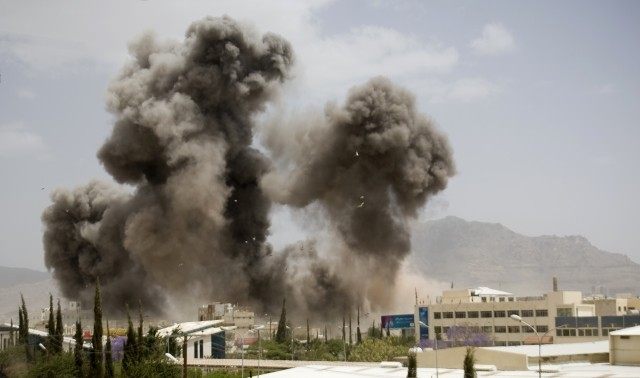The U.S. is widening its role in the Saudi Arabia-led campaign against Iranian-backed Houthi rebels in Yemen, screening military targets and searching vessels for Yemen-bound game-changing weapons from Iran, reports The Wall Street Journal.
According to the WSJ, a senior U.S. defense official is accusing Iran of potentially supplying the Houthi rebels with heavy weapons.
An unnamed senior U.S. defense official cited by WSJ said America knows Iran is attempting to deliver surface-to-air missiles and has, therefore, increased surveillance in the region to monitor Iran and the Houthis.
“We are looking,” said the senior U.S. defense official. “We know they are trying to do it.”
Saudi-led airstrikes against suspected Houthi targets and their allies have damaged runways in Yemen, making it difficult for Iran to deliver weapons to the rebels by air.
“[The Iranians] don’t have an easy route in from the air. They don’t have an easy route in from the sea,” an anonymous senior U.S. military official told the newspaper outlet. “There’s lots of intelligence focused on what they’re doing—from loading to potential delivery.”
Anonymous U.S. and Arab officials indicated to the WSJ that the U.S. is expanding its role in Saudi Arabia’s campaign in Yemen.
The U.S. Navy, in supporting a Saudi naval blockade of Yemen’s ports, has intensified its search for Iranian weapons destined for Houthi rebels in Yemen.
Notes the WSJ:
On April 1, sailors on an American destroyer in the Red Sea halted a Panamanian-flagged freighter suspected of delivering Iranian weapons to the Houthis and searched the vessel. Although the search came up empty, it marked the navy’s first boarding operation in an expanding campaign to thwart the Houthis.
The U.S. has also increased intelligence-sharing with the Saudis, vetting military targets and at times identifying locations where bombs should be dropped.
“Under the new arrangement, the Saudis pick their own targets, and then provide that information for review to Pentagon war planners at a joint operations center,” the WSJ explains.
The article adds that U.S. military and intelligence officials are charged with analyzing the suspected target sites and then advise the Saudis on how they think Saudi commanders can effectively carry out the airstrikes.
Part of the analysis provided by the U.S. includes identifying specific bomb targets.
“The United States is providing our partners with necessary and timely intelligence to defend Saudi Arabia and respond to other efforts to support the legitimate government of Yemen,” said Alistair Baskey, a White House National Security Council spokesman, according to the WSJ.
Sometimes the Saudis launch airstrikes before the U.S. can review the targets, officials reportedly said, adding that this happens when the Saudis consider the bombing time sensitive.
“The Obama administration is skeptical the airstrikes will reverse the Houthi gains. Worried by the risk of more direct intervention by Iran, U.S. officials say they are urging the Saudis to set their sights more narrowly on halting rebel advances and reaching what amounts to a battlefield stalemate that leads all sides to the negotiating table,” reports the paper.
The Saudi-led coalition began its bombing campaign more than two weeks ago, on March 26.
According to U.N. officials, at least 648 civilians have been killed since the beginning of the airstrikes, which have reportedly hit hospitals, schools, a refugee camp, and neighborhoods.
The Saudis blame the Houthis and their allies for civilian casualties, arguing that they are doing their best to avoid them.
U.S. and Saudi officials have accused Iran of arming, training, and funding the Houthis, allegations that both Iran and the Houthi rebels deny.
The U.S. has expedited arms shipments to the Saudi-led coalition.
Follow Edwin Mora on Twitter: @EdwinMora83.

COMMENTS
Please let us know if you're having issues with commenting.